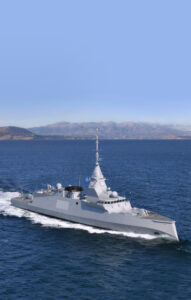Greece signed contracts with Naval Group on March 24, finalizing plans to buy at least three Defense and Intervention Frigates (FDI) for the Hellenic Navy (HN).
The agreement calls for two of the FDI HN frigates to be delivered by 2025 and the third by 2026 as well as an option for a fourth frigate. The company said the frigate procurement is spread over two contracts and includes in-service support for the ships.
The agreement was signed in Athens on Thursday by Vice Adm. Aristeidis Alexopoulos, head of the Greek General Directorate for Defense Investments and Armaments and Pierre Éric Pommellet, Chairman and CEO of Naval Group. Greek Minister of Defense Nikolaos Panagiotopoulos and the French Minister of the Armed Forces Florence Parly, also attended the event.
Last September, Greece officials first signed a Memorandum of Understanding with Naval Group and weapons partner MBDA to start negotiations on the deal, estimated to cost upward of $3.5 billion (Defense Daily, Sept. 29, 2021).
At that time, the framework said Naval Group will build the frigates in Lorient, France, where the French government has already contracted five similar frigates. As of September, the second French frigate entered production.
Subsequently, the Greek and French governments agreed to a new strategic partnership to further these kinds of agreements.

Naval Group said the FDI HN will have a displacement of 4,500 tons, is about 122 meters long, can travel up to 27 knots, and has aviation facilities to operate a 10-ton class helicopter and vertical takeoff and landing unmanned aerial vehicle (UAV).
The frigates will be armed with 32 Aster and eight Exocet MM40 B3C missiles developed by MBDA, an unspecified amount of RAM missiles, Naval Group MU 90 torpedoes, a 76 mm gun, four torpedo tubes and the company’s CANTO countermeasures.
“Naval Group is proud, along with its French industrial partners Dassault, MBDA and Thales, to be a part of this new chapter in the strategic alliance between Greece and France,” Naval Group’s Pommellet, said in a statement.
“Greece has chosen the latest generation of frigates that bring together the best of French naval know-how and will strengthen the capabilities of the Hellenic Navy. The frigates program is the first of many steps in the partnership between Naval Group and the Hellenic Navy and will contribute to the development of the partnership between our countries, our navies and our industries for decades to come,” he added.
Naval Group noted this is a “very ambitious cooperation plan with the Hellenic industry,” offering several industrial opportunities within Greece to support the frigate program.
“Naval Group’s teams have been working in Greece for several months to establish partnerships with local industrial players with the objective of signing the first contracts in the coming months. With its R&D component, the cooperation plan is a sustainable plan that is fully in line with the objective of strengthening the European defense industrial and technological base through Franco-Greek cooperation,” the company said in its press release announcing the deal.
Naval Group said the FDI HN has capabilities in anti-ship, anti-air, anti-submarine, and special forces operations. It also features air and surface defense systems connected to sensors like the Thales Sea Fire all-digital multifunction radar.
According to a Thales factsheet, the Sea Fire is a Gallium Nitride active electronically scanned array (AESA) radar with four antenna panels. The company boasts it has a 186 miles air coverage range and can track over 800 objects simultaneously up to 90 degrees elevation.
“It brings moderate size frigates the power & performance of destroyers dedicated to extended air defense with advanced surveillance and fire control capabilities,” Thales said.
Naval Group also said FDI HN will be the first frigate on the market natively protected against cybersecurity threats, with the vessel featuring two data centers that host nearly all of the ship’s applications.
These contracts appear to kill any remaining chance Greece would shift from the Naval Group ships to American offeror Lockheed Martin [LMT], which competed with a vessel based on its Multi-Mission Surface Combatant (MMSC) design, itself derived from the Freedom-variant Littoral Combat Ship.
The Greek decision was part of a process where the Hellenic Navy is looking to upgrade its current MEKO 200 frigates, gain an interim capability while they are being updated, and buy four new frigates.
In December, the State Department approved a $9.5 billion potential Foreign Military Sale for four MMSCs in case Greece ended up changing its mind or the Naval Group deal fell through (Defense Daily, Dec. 13, 2021).
At the time, industry sources told Defense Daily Greece sent the U.S. a letter of request summarizing its requirements, with the State Department approval, covering a range of potential components that can be procured whether Greece chose Naval Group over Lockheed Martin for the new ships.
The approval options include capabilities Greece could use in addition to the French deal, like offering LCSs in the interim before the new frigates are completed, the sources said.
In the FY ‘22 budget request, the Navy sought to retire several Freedom-variant LCSs early, partially due to the cost of fixing a combining gear defect in operational ships. The defect limits the speed of the ships to 35 knots.
Last July, Vice Adm. James Kilby, then-Deputy Chief Of Naval Operations For Warfighting Requirements And Capabilities, told a congressional panel the USS Detroit (LCS-7) and Little Rock (LCS-9) might have a future after their proposed divestment as either a reserve capacity or in Foreign Military Sales (Defense Daily, July 21, 2021).